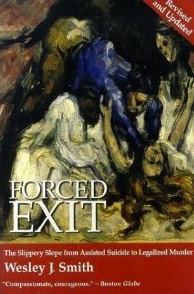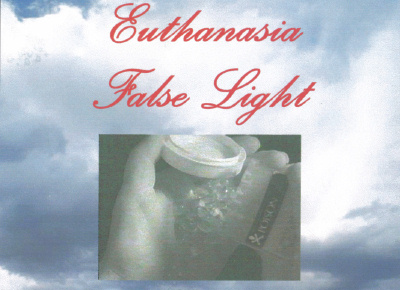From the book jacket:
 Imagine you have just been admitted to the hospital and are asked to sign a living will, giving the hospital the right not to prolong your life if you fall into a coma. You sign, thinking that the living will serves only to prevent medical staff from taking “extraordinary measures,” such as putting you on a breathing machine in such a situation. Think again. Living wills have already been used to deny patients treatment they needed and wanted.
Imagine you have just been admitted to the hospital and are asked to sign a living will, giving the hospital the right not to prolong your life if you fall into a coma. You sign, thinking that the living will serves only to prevent medical staff from taking “extraordinary measures,” such as putting you on a breathing machine in such a situation. Think again. Living wills have already been used to deny patients treatment they needed and wanted.
For example, such a document became the death warrant for one elderly woman: Although the post-surgery complication she developed was treatable, hospital personnel misconstrued the intent of her living will and stood by or twenty minutes, watching her die.
Polls show that many Americans, favor legalizing assisted suicide – or the “right to die,” as it is sometimes termed. However,Forced Exit provides convincing evidence that we have been deceived about what is at stake in this debate, and effectively illustrates how these deceptions threaten us all.
Euthanasia advocates claim that assisted suicide would be restricted to a “last resort” for people already on the verge of death and in unrelievable agony. But, as consumer activist and attorney Wesley J. Smith shows, these premises have already been proved false. Smith demonstrates that most patients and their families are generally unaware that pain can often be effectively reduced or eliminated. He also provides evidence that many people whose deaths have been hastened by euthanasia were not, in fact, terminally ill. Some doctors are now claiming the right to refuse disabled and seriously ill patients the medical treatment they want.
Smith argues cogently that legalizing euthanasia and assisted suicide would be a disaster for the most powerless…
Through original reporting, exhaustive research, historical analysis, scores of true stories, and extensive interviews with doctors, ethicists, and activists, Forced Exit makes a compelling case against legalizing assisted suicide and takes a closer look at the truly humane and compassionate alternatives – hospice care for the dying, more effective pain control, independent living for the disabled – that can transform a death wish into a desire to live.
Forced Exit offers chilling evidence of just how powerful and dangerous the death culture in America has become and offers a clear-eyed, realistic exploration of one of the most important and wrenching ethical issues of our time.
What have they said about FORCED EXIT?“
This important book puts forth an argument that is less and less acceptable as American nears the millennium — against the quick fix. Out of a passionate concern, Wesley J. Smith marshals the arguments against permitting assisted suicide. ” Boston Globe
“Wesley J. Smith’s Forced Exit shows why the public should reject Kevorkianism in all its forms. Laying out his case with clarity and restraint, Smith blends reasoned argument with blood-curdling anecdotes, proving beyond a reasonable doubt that legalizing assisted suicide would be a sure step on the road to bureaucratized euthanasia.” The Weekly Standard
“Wesley Smith argues urgently in Forced Exit that the slippery slope exists — indeed, we’re already on it — and he makes an overwhelmingly persuasive case. . . . After Forced Exit, dismissing the slippery slope will be impossible.” The Detroit News
“Powerful arguments from a passionate, articulate . . . spokesman.” Kirkus
“Wesley J. Smith argues convincingly in Forced Exit that the so-called ‘quality of life’ ethic has already taken a toll on the nation’s sensibilities and that, unless we are careful, we will be swept headlong into what John Paul II has so aptly called ‘the culture of death.'” First Things
“Finally, a lucid, comprehensive, and absorbing account of a dangerous movement that will eventually affect us all if assisted suicide is legalized, for it will inexorable lead to lawful euthanasia.” Nat Hentoff, columnist, The Washington Post and The Village Voice.
“Wesley Smith maintains a balance between sane, well-grounded observation and deeply felt passion. In so doing, he brings a needed dimension of human complexity to the discussion of assisted suicide. More than others who have written on this subject, he introduces readers to human perspectives that have been overlooked. In particular, the voices of persons with disabilities who have worked hard to analyze the impact of assisted suicide on their community and on greter society emerge powerfully.” Carol J. Gill, Ph.D. president, Chicago Institute of Disability Research; adjunct professor, physical medicine and rehabilitation, Northwestern University Medical School
“Forced Exit argues against legally assisted suicide in so many compelling ways. It should drive the terms of debate on this highly charged controversy that is sweeping a country in the grip of rationed care and the plight of millions of uninsured Americans.” Ralph Nader, consumer advocate
“Wesley Smith offers a compelling argument against legalizing assisted suicide and clearly explains the devastating effects it would have on an unwary public.” C. Everett Koop, M.D., former surgeon general
“In Forced Exit, Wesley J. Smith clearly and convincingly reveals the disturbing social ills lurking beneath the benign sheep’s clothing of the euthanasia movement.” Ira Byock,M.D., president, American Academy of Hospice and Palliative Medicine
FORCED EXIT by Wesley J. Smith (Times Books, 1997) is available through book stores and in most public libraries. It can also be ordered from the IAETF.
To order a copy of FORCED EXIT, see order form.




